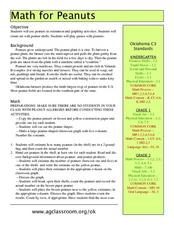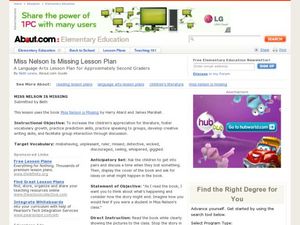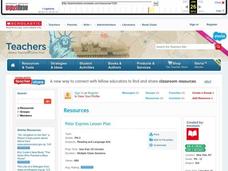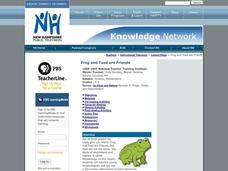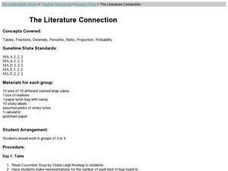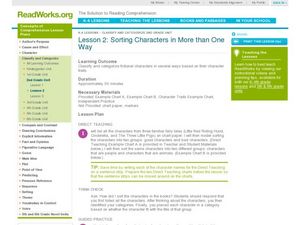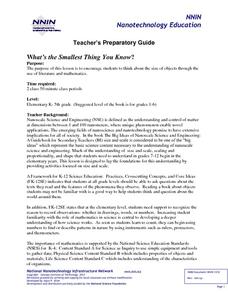Oklahoma State University
Math for Peanuts
Peanuts! Get your peanuts! Kids explore math, art, and agriculture concepts focused on peanuts. There is a brief informational text to get them started, and you'll find definitions of five in-text vocabulary words to address. Kids...
Mary Pope Osborne, Classroom Adventures Program
Mummies in the Morning Egyptian pyramids, hieroglyphics
Visit the Magic Treehouse and take your class on a trip through time with a reading of the children's book Mummies in the Morning. Using the story to spark an investigation into Egyptian culture, this literature unit engages...
Curated OER
Miss Nelson is Missing Lesson Plan
Second graders listen to the story Miss Nelson is Missing by Harry Allard and James Marshall. In this literature activity, 2nd graders predict the story's ending with drawings and discussions within groups.
Curated OER
Weather or Not!
Young pupils will be sure to love this series of four lessons which deal with the winter season. These cross-curricular lessons cover visual art, science, math, writing, literature, and movement. Absolutely fantastic! The images of...
Curated OER
"Weighing the Elephant"
Can your class solve the problem presented in the Chinese folktale, "Weighing the Elephant?" Read your class the description before having them attempt to solve the problem. After they've come up with an answer (or attempted to!), finish...
Baylor College
Gases Matter
As a demonstration or as a hands-on activity, your class watches as the combination of vinegar and baking soda produce carbon dioxide gas. The intent of the lesson is to help youngsters understand that gases occupy space. It is included...
Curated OER
Cloudy with a Chance of Meatballs
Students explore the 5 themes of geography. For this cross curriculum literacy and geography lesson, students listen to Cloudy with a Chance of Meatballs by Judi Barrett, and make a list of the needs of the people in Chewandswallow....
Curated OER
Geo Jammin' - Day 1, Lesson 3: Math Moments on My Mind
Second graders write a Math Moments journal.
Baylor College
There's Something in the Air
Clever! In order to compare indoor and outdoor dispersal rates for the movement of gases and particles through air, collaborators will participate in a classroom experiment. Set up a circular grid and set students on lines that are...
Curated OER
Geo Jammin' By DeSign - Day 3, Lesson 15: The Quiltmaker's Gift
Students listen to a read aloud of The Quiltmaker's Gift by Jeff Brumbeau finding examples of symmetry in the illustrations in the book.
Curated OER
A Turkey for Thanksgiving - Lesson #2
Second graders investigate realistic fiction, holiday celebrations, making tally charts. In this multi-disciplinary lesson, 2nd graders listen to a story about Thanksgiving and one about the Chinese New Year to develop an understanding...
Curated OER
Polar Express Lesson Plan
Students write and illustrate a wish for the first gift of Christmas. In this Christmas lesson plan, students read the book The Polar Express and then write what they wish could be the first gift of Christmas.
Curated OER
Frog and Toad are Friends
Students view a 30-minute video activity to discover information about the characteristics of frogs and toads. They then transform themselves into frogs and participate in a Jumping Frog Jubilee. They work in groups of three to measure...
Curated OER
The Literature Connection
Second graders read Cucumber Soup by Vickie Leigh. They make representations for the number of each kind of bug found in the book. This lesson plan is a terrific way to show students how fractions, decimals and percents are related.
Curated OER
Counting Crows
Young scholars discuss the fable, The Crow and the Pitcher. In this literature instructional activity, students read the fable and create a crow sock puppet. Young scholars use their puppets to dramatize the fable.
Curated OER
Going Graph-y
Second graders listen to and dicuss the story Where the Wild Things Are. They play a pantomime game and act out various feelings so their classmates can guess. They listen for the frequency of certain words, and record their findings on...
Baylor College
Fungus Among Us
In order to learn that mold spores can be found in the air, observers grow bread mold and make observations for a few days. Afterward, they participate in a class discussion to arrive at the knowledge that bread spores are present in the...
Baylor College
Healthy Homes
Meant to follow a lesson about how concentrated air particles can be inside of a building, this resource gets individuals to assess the possible air pollutants in their own homes. They take home a worksheet and circle spots on it that...
Curated OER
Where Am I, and How Do I Get Where I am Going?
Students describe geographical places through art, music, writing, and math. They compile information in booklets which may be published.
Curated OER
Caldecott Medal Winners
Second graders identify Caldecott Medal winners. In this library media lesson, 2nd graders view an overhead transparency of Caldecott Medal winners from 1987-2004 and answer questions based on the data that is displayed.
Curated OER
Value Of Money
Students read the book "Alexander, Who Used To Be Rich Last Sunday," along with their teacher and take away coins as they follow along with the story. In this money and counting lesson, students get meaningful practice in the art of...
Curated OER
Geo Jammin' - Day 2, Lesson 6: Rhyme and Reason
Students listen to the poem "Shapes" by Shel Silverstein in order to accurately and specifically describe shapes' rules/traits in their journals. They illustrate the poem and take turns reading during a creative shared reading session.
Curated OER
Sorting Characters in More Than One Way
Introduce your class to characterization. Familiar story characters are sorted into "good" and "bad" categories based on the characters' personalites and actions in the story. The class discusses and describes characters they have read...
National Nanotechnology Infrastructure Network
What’s the Smallest Thing You Know?
Elementary learners listen to a story, then sort objects from largest to smallest at six different stations around the classroom. Adaptable for a large range of age and ability groups.
